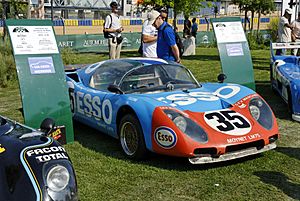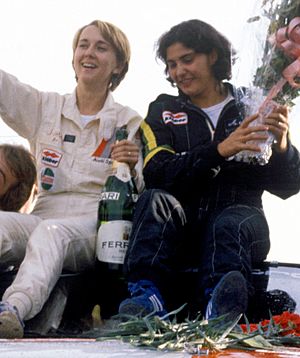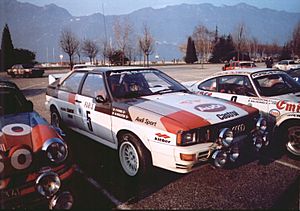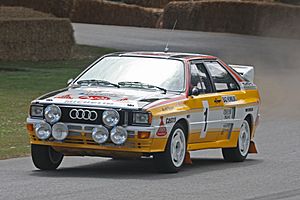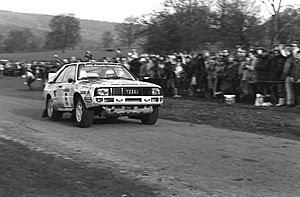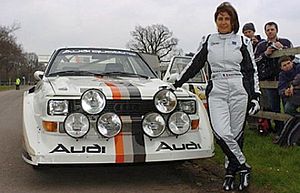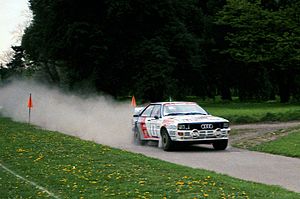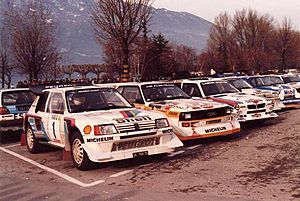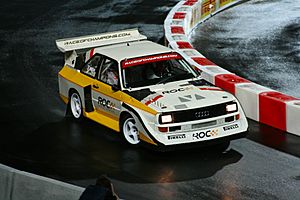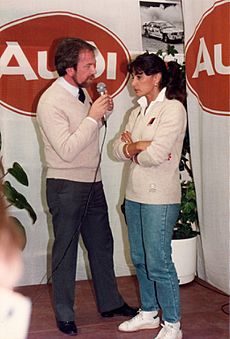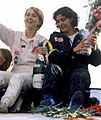Michèle Mouton facts for kids
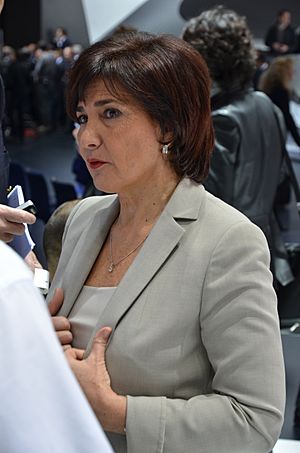
Mouton in 2011
|
|
| Personal information | |
|---|---|
| Born | 23 June 1951 Grasse, France |
| World Rally Championship record | |
| Active years | 1974–1986 |
| Co-driver | |
| Teams | Fiat, Audi, Peugeot |
| Rallies | 50 |
| Championships | 0 |
| Rally wins | 4 |
| Podiums | 9 |
| Stage wins | 162 |
| Total points | 229 |
| First rally | 1974 Tour de Corse |
| First win | 1981 Rallye Sanremo |
| Last win | 1982 Rally Brazil |
| Last rally | 1986 Tour de Corse |
Michèle Mouton (born on June 23, 1951) is a famous French former rally driver. She competed in the World Rally Championship for the Audi factory team. Michèle won four races and finished second in the drivers' world championship in 1982.
Mouton first started in rallying as a co-driver, helping someone else navigate. But she soon moved to the driver's seat, driving an Alpine-Renault A110 in national rallies. In 1975, she also raced on circuits and won a special class in the 24 Hours of Le Mans race.
After joining Fiat France in 1977, Mouton finished second in the European Rally Championship. She then won the 1978 Tour de France Automobile and got good results in her home races in the WRC. These included the Tour de Corse and the Monte Carlo Rally. In 1981, Audi Sport signed Mouton to race alongside Hannu Mikkola. In her first year with the amazing Audi Quattro, she won the Rallye Sanremo race, which was a big surprise.
In the 1982 World Rally season, Mouton came very close to winning the championship. She finished second overall to Walter Röhrl. She won races in Portugal, Brazil, and Greece. She also helped Audi win its first team championship. The next year, she finished fifth. By 1984, Audi had many top drivers, so Mouton raced part-time. In 1985, she won the Pikes Peak International Hill Climb in the United States, setting a new record time.
In 1986, she joined Peugeot and won the German Rally Championship. She was the first female driver to win a major rally championship. Soon after winning, Mouton stopped rallying because Group B rally cars were banned. In 1988, she helped create the Race of Champions event. This event remembers her friend and rival Henri Toivonen. In 2010, Mouton became the first president of the FIA's Women in Motorsport Commission. In 2011, she became the FIA's manager for the World Rally Championship.
Contents
Michèle Mouton's Racing Journey
Early Life and First Races
Michèle Mouton was born on June 23, 1951, in Grasse, France. This town is near the mountains used in famous French rallies. Her parents grew flowers on their large property. After high school, Mouton started studying law, but she soon left to focus on rallying.
Michèle started driving her father's Citroën 2CV when she was 14. But she only became interested in rallying in 1972. Her friend Jean Taibi asked her to practice for the Tour de Corse rally with him. Mouton later helped him as a co-driver in the 1973 Monte Carlo Rally. This was the very first World Rally Championship (WRC) event.
After a few more rallies, Michèle's father suggested she try driving. He promised to buy her a car and give her one year to prove herself. Driving an Alpine-Renault A110, she first raced in the Rallye Paris – Saint-Raphaël Féminin. Then she competed in the Tour de France Automobile. In a race called Île de Beauté in late 1973, Mouton finished eighth overall.
World Rally Championship Debut
Mouton started driving in the World Rally Championship in 1974. She finished 12th in the Tour de Corse in an Alpine A110. Some people thought her car had a special engine, but it passed all inspections. By the end of 1974, Mouton was the French and European ladies' champion.
The next year, in 1975, she raced in the Tour de Corse again and took seventh place. Mouton won her ladies' titles again. She also raced on circuits. In an all-female team, she won the two-litre prototype class at the 1975 24 Hours of Le Mans. She remembered passing everyone in the rain during that race. Her good results helped her get a big sponsor, the French oil company Elf. In 1976, Mouton finished 11th in Monte Carlo but had to stop early in other races.
Joining Fiat Team
For the 1977 season, Fiat France signed Mouton to race with Jean-Claude Andruet. She didn't like how the Fiat 131 Abarth handled, saying it felt "like a big truck." However, the car was successful, and Mouton got very consistent results. She finished eighth in the Tour de Corse in 1977 and fifth for three years in a row from 1978 to 1980. In 1980, she was running as high as second before her engine stopped. In Monte Carlo, she finished seventh in 1979 and 1980.
Outside the WRC, Mouton won the 1977 RACE Rallye de España in a Porsche Carrera RS. She also finished second in the 1977 Tour de France Automobile. She came in second to Bernard Darniche in the overall European Rally Championship. Mouton then won the Tour de France with the 131 Abarth the next year. She finished fifth in the European Rally Championship standings. In 1979, Mouton was second in the French Rally Championship.
Racing for Audi
1980: A New Start
In 1980, Audi Sport, Audi's new factory team, called Mouton and signed her for the 1981 season. Mouton was very surprised by Audi's offer. Audi's choice to pick her instead of male drivers got a lot of attention. The Audi Quattro was a new type of rally car. It was the first to have over 300 horsepower, a turbocharger, and four-wheel-drive.
The Quattro was not yet approved for official races, so Audi could only enter rallies as "zero cars." These cars drive the course before the race to check it. Hannu Mikkola first drove the car in October. Mouton joined another driver for a Finnish rally and also showed good speed. Mouton found the car hard to control at first. But she got better after learning "left-foot braking" from Mikkola. Audi planned to race in eight events in 1981.
1981: First WRC Win
Mouton's first race in the Quattro in Monte Carlo didn't even start. She had to pull out because of engine problems. At the Rally Portugal, she started working with her Italian co-driver Fabrizia Pons. Mouton won seven special stages and finished fourth, her best result yet. This stopped people from criticizing Audi for signing a female driver.
After a race where her car broke down, Mouton set many fast times at the Acropolis Rally in Greece. Later, at the Rallye Sanremo in Italy, Mouton took the lead when another driver crashed. She held off other top drivers to win the race. This was the first time a female driver had won a world championship rally event. Her male rivals were very surprised. One driver had said, "Never can nor will I lose to a woman."
Mouton remembered her first win in an interview: "It was a big fight right into the last night. We had a problem with the brake pads, so we lost a lot of time. We finished three days rallying, night and day, 32 seconds in front of Ari Vatanen. I couldn't sleep at all. Then I arrived at the special stage, about 42 km long, and I said 'OK, we forget everything, and we are at the first stage of the rally again, because one of us will crash.' And so Ari hit a rock, and we won the rally."
In the last race of the season, the RAC Rally in Great Britain, Mouton was doing well. But her Quattro had gearbox problems, and she had to stop. Mouton finished the season in eighth place in the drivers' championship.
1982: Runner-Up in the World
Mouton's 1982 season began with a big crash at the Monte Carlo Rally. She hit ice and crashed into a stone wall at 110 km/h (70 mph). Mouton hurt her knee, and Pons had a concussion. She had been in third place. Their injuries were not serious, and Mouton then raced in the Swedish Rally. She was running third when she slid into a snow bank. She finished fifth.
In Portugal, Mouton won 18 stages and took a clear victory. She once said that to be competitive, she imagined the crowds by the road were trees. At the Tour de Corse, she finished seventh. At the Acropolis Rally, Mouton won again. This brought her closer to the championship leader, Walter Röhrl.
In New Zealand, Mouton was doing well and leading the race. But her car's oil pump broke, and she had to stop. After seven races, Mouton was second in the championship. The Rally of Brazil was difficult, with chaotic conditions. Only five teams finished, but Mouton won her battle with Röhrl.
At the 1000 Lakes Rally, Mouton drove too fast into a jump and damaged her Quattro. She rolled the car and had to stop. In Sanremo, she was in a close fight for the win. She recorded nine stage wins but finished fourth behind Röhrl.
Audi decided to enter the Rallye Côte d'Ivoire to help their title chances. Just before the race, Mouton learned her father had passed away. His last wish was for her to start the rally. After the first day, she was eight minutes ahead of Mikkola and almost half an hour ahead of Röhrl. On the third day, Mouton had mechanical problems, and her lead shrank. With only 600 km to go, Mouton went off the road and rolled her car. She tried to drive the damaged car but had to give up.
Röhrl won the race and became world champion. Mouton did not focus on losing the title, as she had just lost her father. Röhrl had said he would accept second place to Mikkola, but not to Mouton, because she was a woman. At the RAC Rally, Mouton finished second behind Mikkola. This result helped Audi win their first team world title. Mouton won the International Rally Driver of the Year award.
1983: Group B Era Begins
The 1983 season started the Group B era of WRC. Mouton now drove the Audi Quattro A1. She also had a new teammate, Stig Blomqvist. For the third year in a row, Mouton had a bad start in Monte Carlo. She crashed into a stone wall at over 100 km/h (60 mph). The car was destroyed, but Mouton and Pons were fine. Mouton said she had to avoid a photographer.
Mouton then finished in the points in several races. She was fourth in Sweden, where Audi took the top four spots. In Portugal, Mouton finished second to Mikkola. After the first part of the Safari Rally, Mouton arrived on three wheels and was "totally exhausted." She finished third. After four races, Mikkola and Mouton were first and second in the championship.
At the Tour de Corse, Audi introduced the Quattro A2. It was lighter and had more horsepower. Mouton's rally ended when her engine caught fire. In Greece, she rolled her car on the first stage. New Zealand was similar to the previous year for Mouton. She took the lead but her engine failed with only six stages left. These three retirements dropped Mouton to fifth place in the championship.
She then finished third in the Rally Argentina. This was her last podium finish of the season. In the 1000 Lakes in Finland, her car caught fire, but she drove it into a lake to put it out. She finished 16th. In the Rallye Sanremo, Mouton finished seventh. In the last race, the RAC Rally, she was in second place. But an Audi mechanic accidentally put water in her fuel tank, causing problems. She later crashed out and finished fifth overall in the drivers' championship.
1984: Part-Time Racing
For the 1984 season, Audi added two-time world champion Walter Röhrl to their team. Mouton now raced part-time, in five WRC events. She did not race in Monte Carlo for the first time in nine years. Instead, she commented on the event for Radio Monte Carlo.
She started her year well by finishing second at the Swedish Rally behind her teammate Blomqvist. Mouton said, "When you are out rallying on ice or snow in country like that it is like dancing. My dancing background helped my rallying." This was her last podium finish in the World Rally Championship.
In the Safari Rally, a part of Mouton's Quattro broke, causing the turbo to fail. She had to stop because her team used parts from her car to fix her teammate's car. Her first race in the new Sport Quattro at the Acropolis Rally ended with engine problems. In the 1000 Lakes, Mouton crashed and continued without a windscreen. But the damage was too bad, and she had to stop. In late October, she signed a new contract with Audi. At the RAC Rally, a small mistake led to a flat tire, and Mouton dropped from third to fifth. She finished 12th in the drivers' world championship.
Outside the WRC, Mouton raced in the Pikes Peak International Hill Climb in the United States. She drove an Audi Sport Quattro with Fabrizia Pons. She won the open rally category in a record time and finished second overall. Her win made some male rivals upset. One driver, Bobby Unser, was reportedly very vocal about losing. Mouton is said to have replied, "If you have the balls you can try to race me back down as well."
1985: Testing and Pikes Peak Win
Audi's WRC program was smaller in 1985. Mouton and Mikkola focused on testing and developing cars. She drove both the Sport Quattro and the Quattro S1. Mouton thought the S1 was the hardest rally car she had ever driven.
Mouton only competed in one world championship event that year. But she raced in a full six-round British Rally Championship. She had many car problems and only finished one race. She finished second at the Welsh Rally behind Malcolm Wilson.
Mouton's only WRC event was the long Rallye Côte d'Ivoire. She was co-driven by Arne Hertz because Pons was sick. Mouton started well and was tied for the lead after the first day. Her Quattro had serious engine problems the next day. The team withdrew Mouton just before the finish, and there was some controversy about whether they had swapped cars. Even though her rallying year was disappointing, Mouton had a successful return to Pikes Peak. She won the event overall in her Sport Quattro. Despite bad weather, she broke a record by about thirteen seconds.
Joining Peugeot and Retirement
Mouton left Audi in late 1985 to join Peugeot for the 1986 season. She raced in the German Rally Championship and two WRC events in a Peugeot 205 Turbo 16. She hired Terry Harryman as her co-driver. Mouton, known as "the black volcano" because of her personality and long black hair, won six of the eight races in the German championship. She secured the German national title after her fifth win of the season. She became the first female driver to win a major rally championship.
Mouton's WRC races were her home events: Monte Carlo Rally and Tour de Corse. In Monte Carlo, she had to stop due to oil pump problems. For the Tour de Corse in May, Mouton was doing well and in third place. But she had gearbox trouble and had to stop. The next day, Henri Toivonen and his co-driver died in a crash. Mouton was still in Corsica and said that if Group B cars were banned, it would be the end for her. Soon after, new rules banned Group B cars for the next year.
In October, after winning the German Rally Championship, Mouton announced she was retiring from rallying. She said the end of the Group B era was the reason. She felt it was "a good time to stop." Later that month, Mouton ended her career by winning the last German championship event.
After Racing: Race of Champions and FIA Roles
In 1988, Mouton helped create the Race of Champions event with Fredrik Johnsson. This event remembers Toivonen and celebrates rally drivers. It started with top rally drivers but now includes stars from other racing sports.
In 1988 and 1989, Mouton took part in rally raids as part of Peugeot's support team. She also raced in the Dakar Rally as a press driver in 2004 and 2009. In 2000, Mouton finished second in the London–Sydney Marathon race. In 2008, Mouton and Fabrizia Pons raced together again in New Zealand. In 2010, Mouton finished second in the Rallye du Maroc.
In 2010, Mouton became the first president of the FIA's Women & Motor Sport Commission. She said she hoped the commission could help more women get involved in motorsport. In 2011, Mouton was named the FIA's manager in the World Rally Championship. Mouton also helps choose people for the Rally Hall of Fame. In March 2012, she was inducted into the Hall of Fame.
Personal Life and Impact
When she retired from rallying, Mouton said she wanted to start a family. She had her daughter, Jessie, in 1987. Mouton said her father's support was key to her success. He loved driving and fast cars and always came to her rallies.
Mouton says she didn't try to beat male rivals, but to be as good as them. She noted that in rallying, time is the most important thing. Many people describe her as "motorsport's most successful ever female driver." Rally experts say Mouton is the driver by whom all other female drivers are measured. Stirling Moss called Mouton "one of the best," and Niki Lauda described her as a "superwoman."
In 2011, French President Nicolas Sarkozy made Mouton a knight of the Legion of Honour. In 2022, a documentary about Mouton called Queen of Speed won an Emmy for Best Sports Documentary. In 2024, Mouton received the first-ever FIA lifetime achievement award.
Michèle Mouton's WRC Wins
Images for kids
See also
 In Spanish: Michèle Mouton para niños
In Spanish: Michèle Mouton para niños
 | Calvin Brent |
 | Walter T. Bailey |
 | Martha Cassell Thompson |
 | Alberta Jeannette Cassell |


